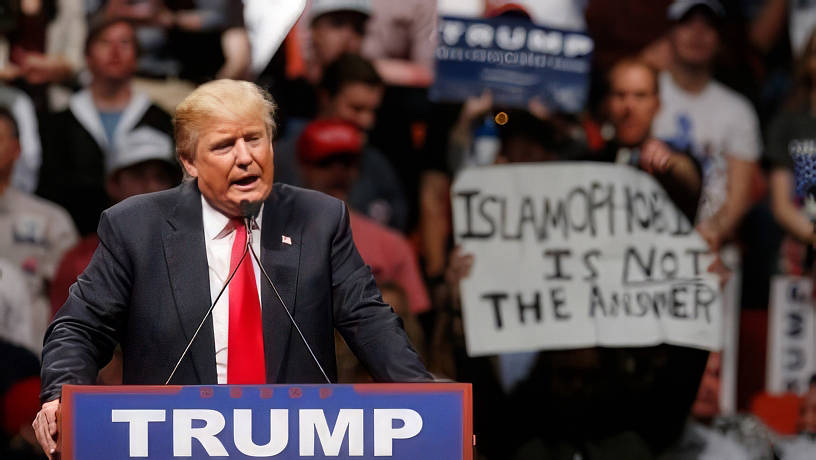
February 15, 2024 / Muslim News Magazine
Assessing the Potential Re-Election of Donald Trump: Impact on Muslims in America
(Los Angeles, CA) – The prospect of Donald Trump potentially reclaiming the presidency raises significant questions about the future direction of American politics and its implications for various communities, including Muslims. Trump's first term was marked by controversial policies and rhetoric targeting Muslims, and a potential return to the White House could have profound implications for Muslims living in America.
During his tenure as president from 2017 to 2021, Donald Trump implemented policies and made statements that significantly affected Muslim communities in America. From the infamous "Muslim Ban" to inflammatory rhetoric vilifying Muslims, his administration perpetuated an environment of discrimination and hostility toward Muslims. This had far-reaching consequences, influencing public perception, institutional practices, and the lived experiences of Muslims across the nation.
The potential re-election of Donald Trump would undoubtedly raise concerns within Muslim communities in America. One of the most significant areas of concern for Muslims under a Trump presidency would be immigration policies. During his first term, Trump pursued restrictive immigration measures, which targeted individuals from predominantly Muslim-majority countries. A resurgence of such policies could disrupt families, limit opportunities for immigration and asylum, and perpetuate a narrative of exclusion and xenophobia, particularly affecting Muslim immigrants and refugees.
In 2017, President Donald Trump issued Executive Order 13769, commonly referred to as the "Muslim Ban." This order suspended entry into the United States for citizens of seven predominantly Muslim countries: Iran, Iraq, Libya, Somalia, Sudan, Syria, and Yemen. Despite legal challenges and revisions, the essence of the ban persisted, affecting countless individuals and families.
For many Muslims, this ban was not just a policy but a symbol of discrimination and exclusion.
One of the most heartbreaking consequences of the Muslim ban has been its impact on families. Many Muslims living in the United States have relatives abroad who were unable to visit or reunite with their loved ones due to the ban. Couples have been separated, parents have been unable to see their children, and siblings have been torn apart. The emotional toll of being unable to be with family members during significant life events cannot be overstated.
Trump's administration also implemented controversial national security measures that disproportionately impacted Muslims, such as increased surveillance and monitoring of Muslim communities. A return to power could see a continuation or intensification of these practices, leading to further erosion of civil liberties and exacerbating feelings of distrust and alienation among Muslims.
Trump's rhetoric and actions as president contributed to stereotyping Muslims in American society. His inflammatory statements, coupled with policies targeting Muslims, emboldened anti-Muslim sentiments and hate crimes. A potential re-election could embolden extremist groups, perpetuate stereotypes, and undermine efforts to replace fear with actual knowledge about the religion of Al-Islam.
Despite the challenges posed by a potential Trump re-election, Muslim communities have demonstrated resilience and solidarity in the face of adversity. Organizations, advocacy groups, and interfaith allies have worked tirelessly to challenge discriminatory policies, promote inclusivity, and protect the rights of Muslims. Additionally, Muslim Americans have continued to contribute to their communities, enriching the fabric of American society through their diverse talents and perspectives.
The possibility of Donald Trump becoming president again raises legitimate concerns about the future of Muslims in America. His previous tenure was marked by policies and rhetoric that disproportionately targeted and marginalized Muslim communities. A return to power could further exacerbate these challenges, threatening the rights, security, and well-being of Muslims in the country. However, amidst uncertainty, American Muslims still yield the power of their vote. With an estimated 4.5 million Muslims in America or more, communities must remain resilient and determined to use that vote for a more inclusive and equitable future for all Americans. It is incumbent upon policymakers, activists, and allies to oppose discriminatory practices and uphold the values of diversity, tolerance, and justice in the United States.
